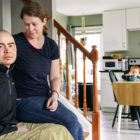Veterans' Health
Army Must Reconsider Applications For Discharge Upgrades Connected To PTSD
|
Thousands of Army veterans with mental illnesses will get a second chance for a higher discharge status and veterans’ benefits because of a settlement in a class action suit brought by two Connecticut veterans. The settlement requires the U.S. Army to “automatically reconsider” every rejected application for discharge upgrades connected with Post Traumatic Stress Disorder (PTSD) or related mental health conditions that it rejected over nine years from April 17, 2011 through November 17, 2020. So far, the Army has identified about 3,500 affected veterans of the Army, Army Reserve or Army National Guard. The lawsuit represented veterans who were given less than honorable discharges for behaviors they contend were triggered by PTSD, traumatic brain injury, military sexual trauma or related issues. The suit contended that the Army failed to follow its own rules that require consideration of mental health in discharge upgrade applications.




